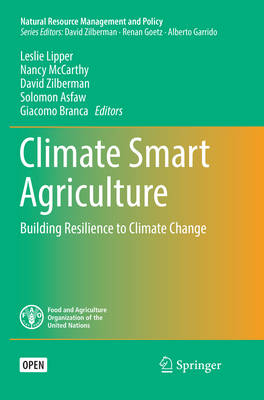
- Afhalen na 1 uur in een winkel met voorraad
- Gratis thuislevering in België vanaf € 30
- Ruim aanbod met 7 miljoen producten
- Afhalen na 1 uur in een winkel met voorraad
- Gratis thuislevering in België vanaf € 30
- Ruim aanbod met 7 miljoen producten
Climate Smart Agriculture
Building Resilience to Climate Change
Omschrijving
This book is open access under a CC BY-NC-SA 3.0 IGO license.
The book uses an economic lens to identify the main features of climate-smart agriculture (CSA), its likely impact, and the challenges associated with its implementation. Drawing upon theory and concepts from agricultural development, institutional, and resource economics, this book expands and formalizes the conceptual foundations of CSA. Focusing on the adaptation/resilience dimension of CSA, the text embraces a mixture of conceptual analyses, including theory, empirical and policy analysis, and case studies, to look at adaptation and resilience through three possible avenues: ex-ante reduction of vulnerability, increasing adaptive capacity, and ex-post risk coping.
The book is divided into three sections. The first section provides conceptual framing, giving an overview of the CSA concept and grounding it in core economic principles. The second section is devoted to a set of case studies illustratingthe economic basis of CSA in terms of reducing vulnerability, increasing adaptive capacity and ex-post risk coping. The final section addresses policy issues related to climate change. Providing information on this new and important field in an approachable way, this book helps make sense of CSA and fills intellectual and policy gaps by defining the concept and placing it within an economic decision-making framework. This book will be of interest to agricultural, environmental, and natural resource economists, development economists, and scholars of development studies, climate change, and agriculture. It will also appeal to policy-makers, development practitioners, and members of governmental and non-governmental organizations interested in agriculture, food security and climate change.Specificaties
Betrokkenen
- Uitgeverij:
Inhoud
- Aantal bladzijden:
- 630
- Taal:
- Engels
- Reeks:
- Reeksnummer:
- nr. 52
Eigenschappen
- Productcode (EAN):
- 9783319870243
- Verschijningsdatum:
- 28/08/2018
- Uitvoering:
- Paperback
- Formaat:
- Trade paperback (VS)
- Afmetingen:
- 155 mm x 235 mm
- Gewicht:
- 978 g

Alleen bij Standaard Boekhandel
Beoordelingen
We publiceren alleen reviews die voldoen aan de voorwaarden voor reviews. Bekijk onze voorwaarden voor reviews.










